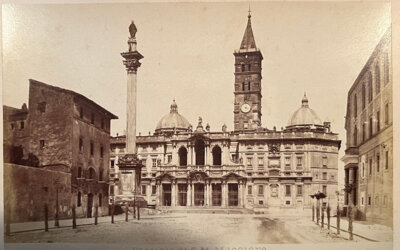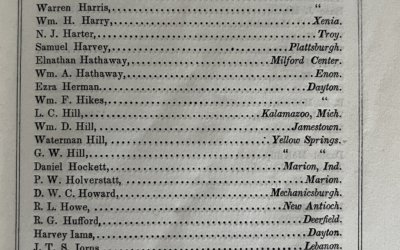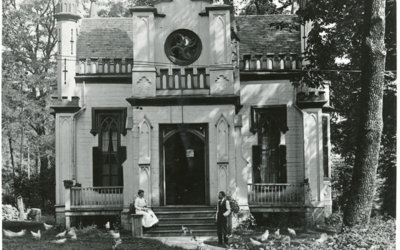Stacks sings a pretty long song this month, but hey, we’ve all got a bit more time to read these days. Historians rightly claim the three Peabody sisters – Elizabeth, Mary, and Sophia – as leading intellectual figures of mid-19th century America; the Peabody brothers – George, Nat, and Wellington – not so much. Wellington, “Welly” for short, was perhaps Dr. Nathaniel and Mrs. Elizabeth Peabody’s greatest disappointment. The family expressed their worries about him as early as the age of six, when Mary wrote to her sister of him, “literally ruining at home. He is idle, lazy, & grows more uneasy at restraint every day.” Still, he showed enough promise and capability that his father went to considerable lengths to get him the education the Peabodys hoped would unlock his potential.
Admitted to Harvard at age 15, Welly discovered a love of gambling and a taste for fancy clothes, both incompatible with his family’s perennial financial difficulties. He left school after one semester, the first member of his class to do, deeply in debt thanks largely to his newfound habits. Hoping to make a man of him, his parents signed him on to the whaling vessel Hector, from which he jumped ship during a stop in Rio de Janeiro. After charming his way back to Boston, he claimed to his eldest sister Elizabeth that he’d been whipped for not working while sick with scurvy and the other sailors were a bad influence on him, but she confided she already doubted the veracity of his stories.
Determined to have a profession, at age 18, Wellington decided on a career in medicine, specifically to study infectious disease. Enthralled by the first-hand account “Cases of Cholera Collected at Paris,” published in 1832 by Dr. James Jackson Jr., he’d concluded that the easiest path to eminence lay in assiduously studying infectious disease while heroically combatting its effects. Apprenticing himself to a Salem physician, he planned to study in Paris as Jackson had done, learning French from his sister as part of his preparation.
The summer of 1837 gave Wellington his chance to duplicate Jackson’s feats, but not in Paris. An epidemic of yellow fever had broken out in New Orleans, a city ravaged by such plagues throughout the 19th century. There he found a job with a doctor named MacFarlane, treating yellow fever patients in a small private hospital.
One of the world’s busiest ports, New Orleans was also on the Middle Passage of the international slave trade, which is likely how a virus mainly transmitted by a mosquito native to Africa took hold there. Physicians of the day, Wellington included, believed instead in the “miasmatic theory” that held disease to be the product of heat, moisture, and decay such as occurs in the swamps of Louisiana. They may have been partially correct, given that such conditions tend to breed mosquitoes, but the direct connection to insect bites was not posited until 1848, incidentally by an Alabama surgeon also known for racist pseudoscientific theories to justify enslavement of African Americans.
Antiochiana holds two letters Wellington Peabody wrote from New Orleans. In the first one to Elizabeth, he reacts to a meeting she had with the guardian of Mary Boardman, a wealthy Charlestown, MA, heiress to whom he had recently (and secretly) proposed marriage. Despite doubts she had about her brother, Elizabeth had agreed to act on his behalf and seek the man’s blessing for the union; she had already told her other brother George that for this to happen, Wellington would have to complete his studies and “continue to behave himself,” indicating something of his reputation back home.
Wellington’s detailed description of his new life in New Orleans clearly shows how badly physicians of the 1830s understood epidemiology. His ambition to impress the folks back home and make a name in his chosen profession and the story he tells about curing a patient mirror the heroic approach that physicians took to medicine at the time. He later comments about how he can only bathe infrequently, highlighting the fact that Western doctors did not yet see the need to wash up as a critical component of treatment (nor would they for decades to come). Sandwiched in between is an almost off-handed remark about possibly getting extra work supervising the enslaved crew of a cotton press, a large, mule-powered machine used to bale cotton for shipment. It seems unlikely that Wellington has the requisite experience for such work, and this may say something about the skill level of enslaved people such that they probably require little or no supervision to do their job.
Despite his recent considerable experience, Wellington is no closer to understanding yellow fever than the authors of the books he dismisses on the subject. He uses calomel, a mercury-based curative that in fact cured little, in the so-called “heroic” dose of 20 grains as prescribed in the 1790s by Dr. Benjamin Rush, a strong proponent of bloodletting. Due to its harmful effects, the Surgeon General banned its use in Army hospitals during the Civil War, but it would nonetheless remain popular into the 20th century.
August 31. Wellington Peabody to Elizabeth Peabody (Addressed: Miss Elizabeth P. Peabody, Salem, Massachusetts, Care of Dr. N. Peabody. Postmarked: New Orleans, Sep 1.)
New Orleans August 31st 1837
Dear Elizabeth
Your letter of 13th Instant case to hand yesterday with its bitter and sweet commingled – and contrary to the usual custom I will begin to answer it from the end and so on to the beginning. What a desperate old unsentimental matter of fact, jealous, impertinent old confirmed Bachelor, Mr. A. is. He has n’t the minutest particle of an idea, about the curiosities of love – Its ups and downs, its crooked current, its trials, & its indomitableness. He does not seem to know that this everlasting opposition merely strengthens the bond of union between Mary and myself, and forms stronger than ever, the determination in me never to give up the ship. Your news would make me very uneasy, had I not the most perfect faith in Mary – so much, that if we both live another year, I have full hope of bringing the affair to an issue of eternal union. I have written to her twice and have a right to an answer eer this – and I shall, as you say, persist in writing – but I do not agree to the proposal of directing to the care of Mr. Adan. Because why? You say that he has imbibed the notion that the motive of our action – is gold – he has evidently got a very unfavorable opinion concerning me – he is severe and moral in his ways – he is prejudiced against you especially – and George Hillard says his prejudices are inerradicable. Therefore if he would insult a lady by gross and ungentlemanly insinuations – he probably would send a verbal bullet through my skull – and as it is now evident that Mary will not be strong in spirit, until the grand crisis of my return – and until she has infused into her some of my energized determination; I am of opinion that it will be better to let the ruffled waters subside – by withholding entirely the elements of commotion. I have no doubt but that she will write to me – and if she does I shall be perfectly satisfied for the present. Would that she might energize, with half the power of the heroine – of the modern Philosophers – and every thing would be well now. But that will never be. I am very happy to hear that she is rosy and happy. So long as her body is well – her mind will be susceptible of improvement and after what has passed we know well the actual state of her feelings with regard to me. Meantime I will write every three weeks to her, and when I get an answer from her I will inform you. Thank heaven, my urgent duties preclude the possibility of much solitary cogitation on the subject. I left a letter of introduction with W. C. Tyler – and his gentle manners and great interest in the affair will stimulate him to look sharp after her welfare and my wishes. We must trust the result to time – and when another year has passed this tremendous affaire du coeur will be brought to an end – which will be like unto a beginning. I hope that whenever you hear any thing of interest, you will inform me of it. Be it weal or woe. There is too much interval between your letters – write oftener.
The weather is terribly warm – thermometer standing at a hundred in the shade – and so it has been this month past – no rain at all. The river has fallen greatly – more than has been known these ten years. Perspiration streams from me incessantly. The evenings are cool and reviving – but it is necessary to put on a thick coat and guard against its pestilential effects by puffing a cigar ~ which rejects the infected saliva. The yellow fever is raging to a great extent on account of the above causes – and I have a grand field for practice – being with the most eminent and successful physician in New Orleans – and having charge of many cases of this tropical scourge. Tis indeed a terrible disease cloaked beneath a deceptive exterior. I do not fear it, although I may have it. But my chances are ten to one against it. For I am never exposed to the sun and we have the best air that New Orleans affords – in our House hospital. I am going to write a letter to Dr. A. L. Pierson on the peculiarities of the fever – as soon as I can get time. I have taken 20 grains of calomel within a day or two – and regulated my liver a little ~ and I drink Lime water occasionally to keep down irritation and neutralize septic principles. Be not alarmed about me any. I am going to make a thesis of the fevers of tropical climates – and I warrant you that I will astonish the M. Medical Society with some new ideas about their nature and treatment. The writers on Yellow fever have written theoretically – and it makes me smile when I take up one of their works – to see how little they know of its nature and treatment. The fevers which have prevailed here have been, principally, Intermittents, Bilious, Remittents, and Yellow Fever – which last commenced about three weeks since.
Indeed have I great opportunity to become acquainted with the features of Disease – that Rubicon to be passed – so much dreaded by the young practitioner – which I have overleaped already. The satisfaction I feel, in raising from the brink of the grave, the suffering patient, is a feeling with which few are acquainted – the gratitude expressed in the eye – in the reverent tip of the tarpaulin of the honest sailor, when I pass along – sends a thrill indefinable through my breast – and is a stimulus of the most powerful kind, to urge me to penetrate into the sublime and glorious philosophy of Medicine – whereof I am enamored. I feel very happy in the consciousness that my patients all love the young Doctor. I was called up one night to go across the street to a person taken suddenly very ill. I mustered in haste – and departed. It was a girl – who appeared insensible and breathed rapidly. I found that she complained of a sharp pain in her breast, and immediately relapsed into that state. My lancet was in her arm directly – and she revived – I prescribed and left her – and in three or four days I cured her of a pleurisy and broke up a Bilious Remittent Fever. The old lady mother was very grateful and I often used to drop in and see them. They removed soon from our neighborhood and after a while I received a piece of wedding cake from the family. I found that her son had been married – and the old lady said that she meant to have had me there; but the wedding was a hurried thing, and they had no time to send for me. These are agreeable dots in one’s existence – which you may realize as you are a philosopher and a scholar.
George is coming to New Orleans immediately – for there is a fine chance for him here, and he feels low spirited and lonely in his present situation. I have heard several times from him. I want him here with me, to revive his spirits, and attend to his bodily ailments, and I expect to do him much good. I have a room for him very near the Hospital, where he will be handy to me and where he will meet with every attention from a watchful brother. l think I can cure his ailments by a long and steady treatment. Though he is better he is not well. His mind is working woefully on his body – for he has been very unfortunate, in being thus pulled down by illness – and it is almost too much for his firm spirit.
Thick clothes and nice ones are as much in requisition here as in the north – and though I cannot send any money yet – I should like a suit very much – other things I can get here. I am pretty sure I will send $50 in the fall. There is the glimmer of a chance, that I may get charge of the slaves at the cotton press here, with a salary attached to it. I can easily attend to it – as it will require only one visit a day, and I have time for it.
I hope you are all well – and that Sophia is getting smart – and that Nat’s prospects will improve – and I hope most sincerely that next summer will see me among you – a well developed physician, ready for action – loaded with a great experience in the nature and treatment of disease. You talk about a bath every day which is impossible – I have to pay 50 cents for every bath I take. So that it costs me a dollar a week for that desirable and necessary
Operation. I take two baths weekly. Write again soon. Give my love to father and mother and tell them that my responsibilities & my mixture with men will make a man of me.
If father should think of sending any clothing – let him send me suit of winter clothes – check drabs and a black dress coat is all I want at present – or shall want these six months to come.
Yrs affectionately
Wellington
Engraving from a series of images titled “The Great Yellow Fever Scourge — Incidents Of Its Horrors In The Most Fatal District Of The Southern States.”
Bettmann Archive/Getty Images
“Songs From the Stacks” is a regular selection from Antiochiana: the Antioch College archives by College Archivist Scott Sanders.



